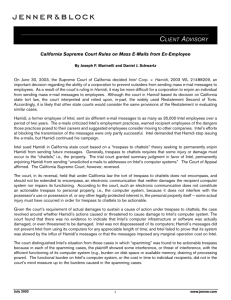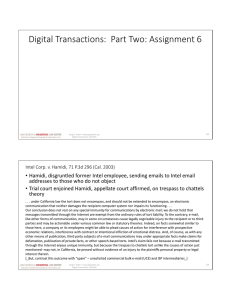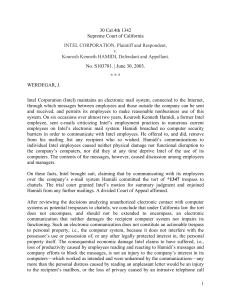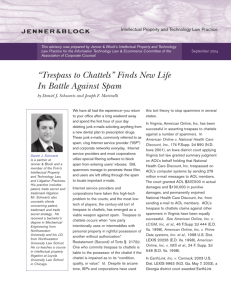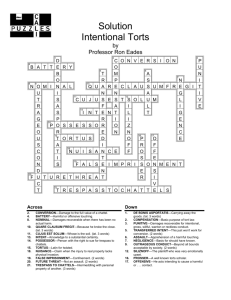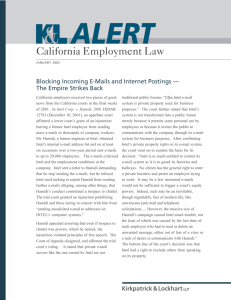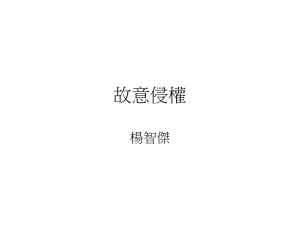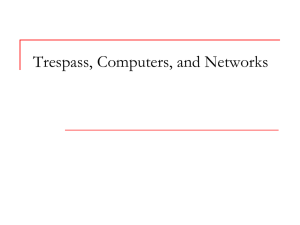Trespass to Chattels
advertisement
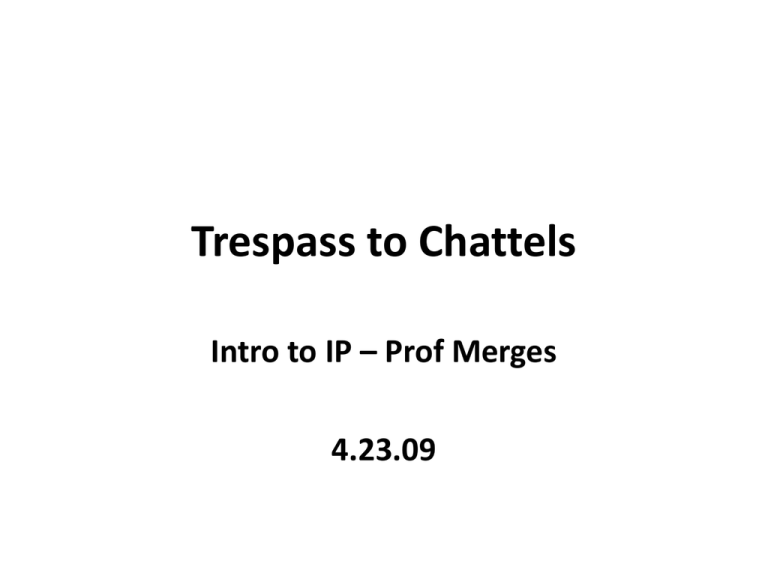
Trespass to Chattels Intro to IP – Prof Merges 4.23.09 eBay v. Bidder’s Edge • Web crawling, indexing, “spidering” • What property right is involved? – Not IP, strictly speaking User Agreement • 7 Pages • Clickwrap agreement • Not a factor in this case – Automatic robots and contractual consent … Automated consent functions • “Robots.txt” file • Good example of Larry Lessig’s concept of “code as law” – Automated software codes shape the legal environment, just as enacted laws do Volume of BE activity • 1.53% of queries • .70 – 1.1% of data transferred Doctrine • Measure of damages; remedy • Future harm; incentives • Trespass to chattels Damages • Pro rata share of “server load” – Support in caselaw? – Actual marginal cost – ? • “Only actual damages suffered by reason of the impairment of the property or loss of its use.” – Zaslow v. Kroenert Zaslow Co-owners (tenants in common) had tiyle dispute • One owner wrongfully “ousted” the other from the premises; then put the ousted person’s personal property into storage • An award of $1,200 as damages for impairment of the personal property of another or loss of its use as a result of placing it in storage was not supported by evidence showing that the highest value placed on the property was $3,500 and that it was not damaged while in storage for about four months. Remanded for recalculation of damages. Preliminary injunction • Typically not given in trespass to chattels cases – usually damages are more appropriate • The harm has already occurred – This is a “lesser included tort” under conversion Thrifty-Tel • The court held that, even if the facts did not support a verdict of conversion as the property taken was intangible, the evidence supported a verdict of trespass to chattels. • Rest. Torts 2d sec. 217, comment e: driving sheep into a canyon and tiring or injuring them Trespass and real property analogy “The analytic difficulty is that a wrongdoer can commit an ongoing trespass of a computer system that is more akin to the traditional notion of trespass to real property, than the traditional notion of a trespass to chattels, because even though it is ongoing, it wil lprobably never amount to a conversion.” -- p. 938 “The court concludes that under the circumstances present here, BE’s ongoing violation of ebay’s fundamental property right to exclude others from its computer system potentially causes sufficient irreparable harm to support a preliminary injunction . . .” Rest. 2d sec. 218 • Why different standards for real vs personal property? • Application to computer systems -- ? • Fellow Former And Current Employees of Intel After a long term legal obligation I'm back and at your service. • Please participate, and keep the faith, we will prevail. Ken Hamidi • Now AMD is kicking Intel's.... • Intel's Worst Nightmare • "Boiling Frogs" is a tell-all, fully-documented report of Intel Inside New Mexico • This is a book that we all must read!!! • Intel releases tons of toxic chemicals into the air and destroys people's lives with no accountability. • Intel is releasing toxic chemicals on residents of Corrales Village and Rio Rancho Community in New Mexico. • Intel filed its second frivolous lawsuit against Ken Hamidi in August of 2003. After spending hundreds of thousands of dollars of shareholders' money, in October of 2004, Intel again miserably lost to Ken Hamidi in Superior Court of Sacramento. Since Intel had learned a very humiliating lesson from its first internationally publicized loss to Ken Hamidi in Supreme Court of California in July of 2003, did not dare appealing the decision of Superior Court of Sacramento in October of 2004 and Intel's loss was finalized in favor of Ken Hamidi/People. • Ken Hamidi said: • Despite Intel's continuous plots, conspiracies, intimidations and bullying efforts and attempts I will: Continue to inform, educate and support Intel employees. Hamidi • “The trespass to chattels tort in California may not be proved without evidence of an injury to the plaintiff’s personal property or legal interest therein.” • -- p. 944 • “Unauthorized and intentional” interference – eBay • What are the limits of this principle? Copyright and web crawling • Field v. Google, 412 F. Supp. 2d 1106 (D. Nev. 2006) • Consent to use the copyrighted work need not be manifested verbally and may be inferred based on silence where the copyright holder knows of the use and encourages it. See Keane Dealer Servs., Inc. v. Harts, 968 F. Supp. 944, 947 (S.D.N.Y. 1997) (“consent given in the form of mere permission or lack of objection is also equivalent to a nonexclusive license”) • According to Dr. Levine, the “no-archive” meta-tag is a highly publicized and well-known industry standard. Levine Report ¶¶ 33-37. Field concedes he was aware of these industry standard mechanisms, and knew that the presence of a “no archive” meta-tag on the pages of his Web site would have informed Google not to display “Cached” links to his pages. Despite this knowledge, Field chose not to include the no-archive meta-tag on the pages of his site. He did so, knowing that Google would interpret the absence of the meta-tag as permission to allow access to the pages via “Cached” links. Thus, with knowledge of how Google would use the copyrighted works he placed on those pages, and with knowledge that he could prevent such use, Field instead made a conscious decision to permit it. His conduct is reasonably interpreted as the grant of a license to Google for that use.

